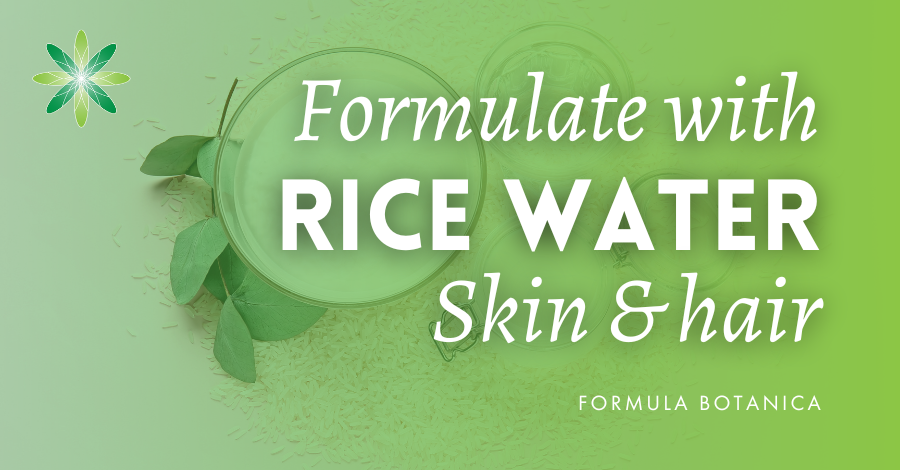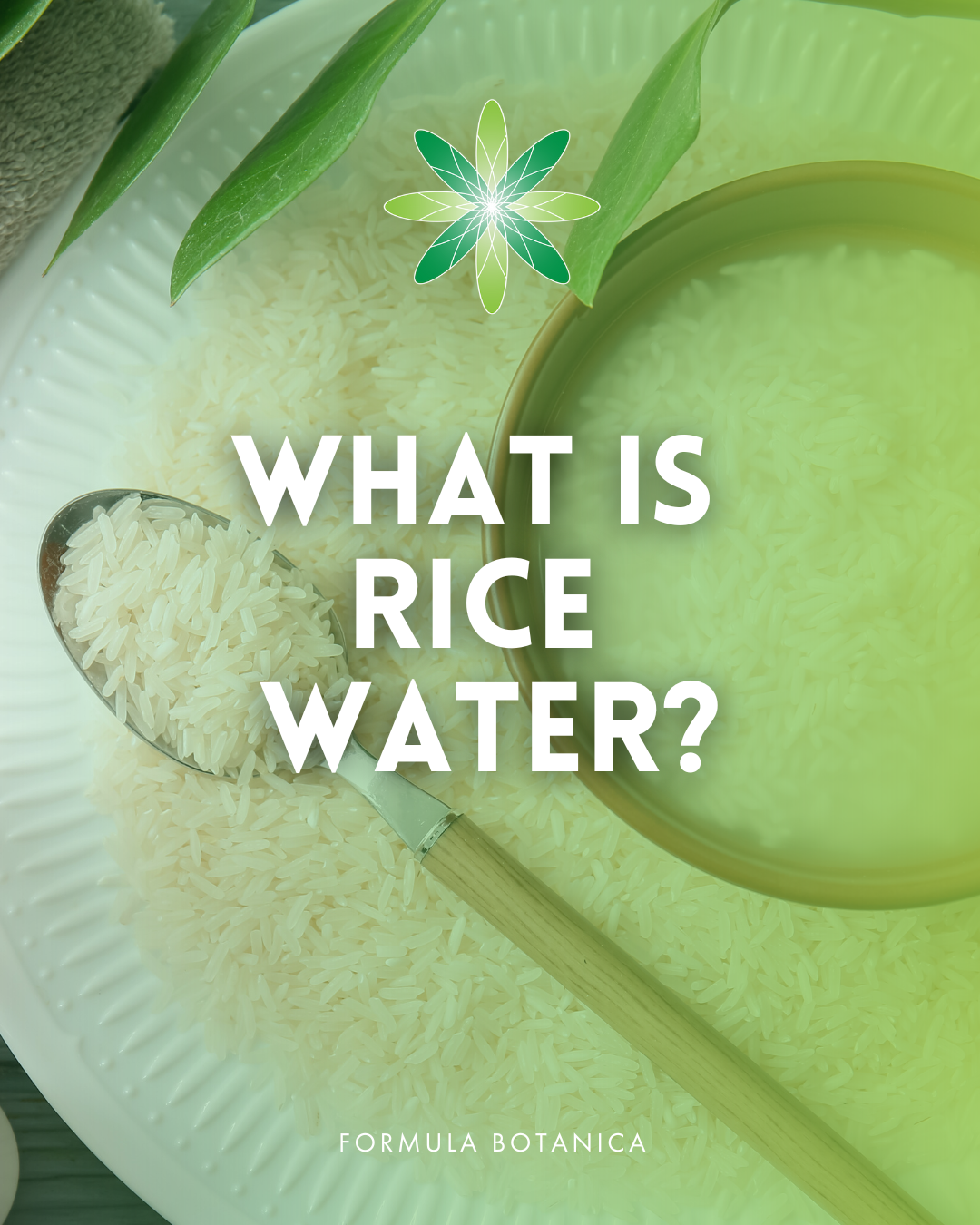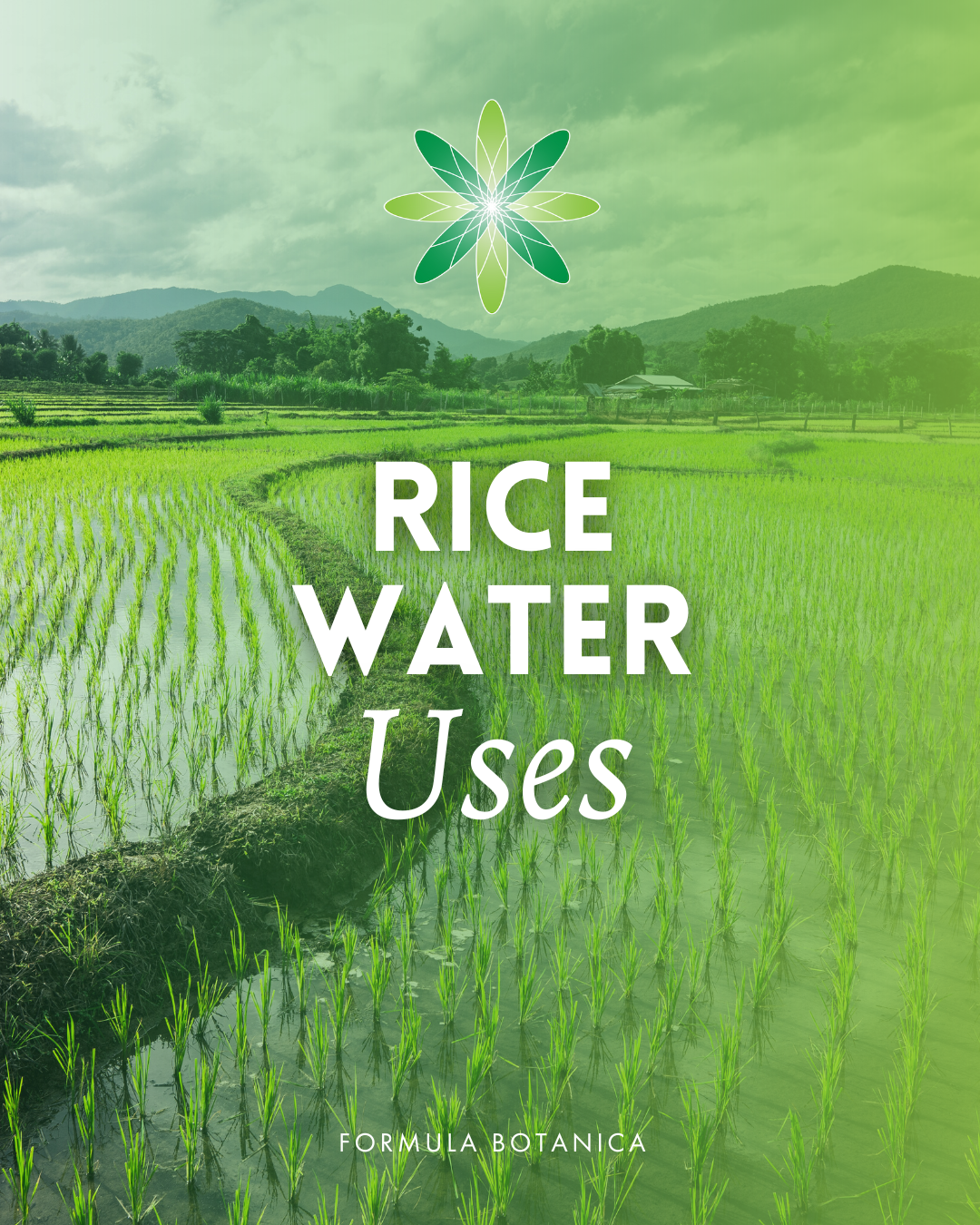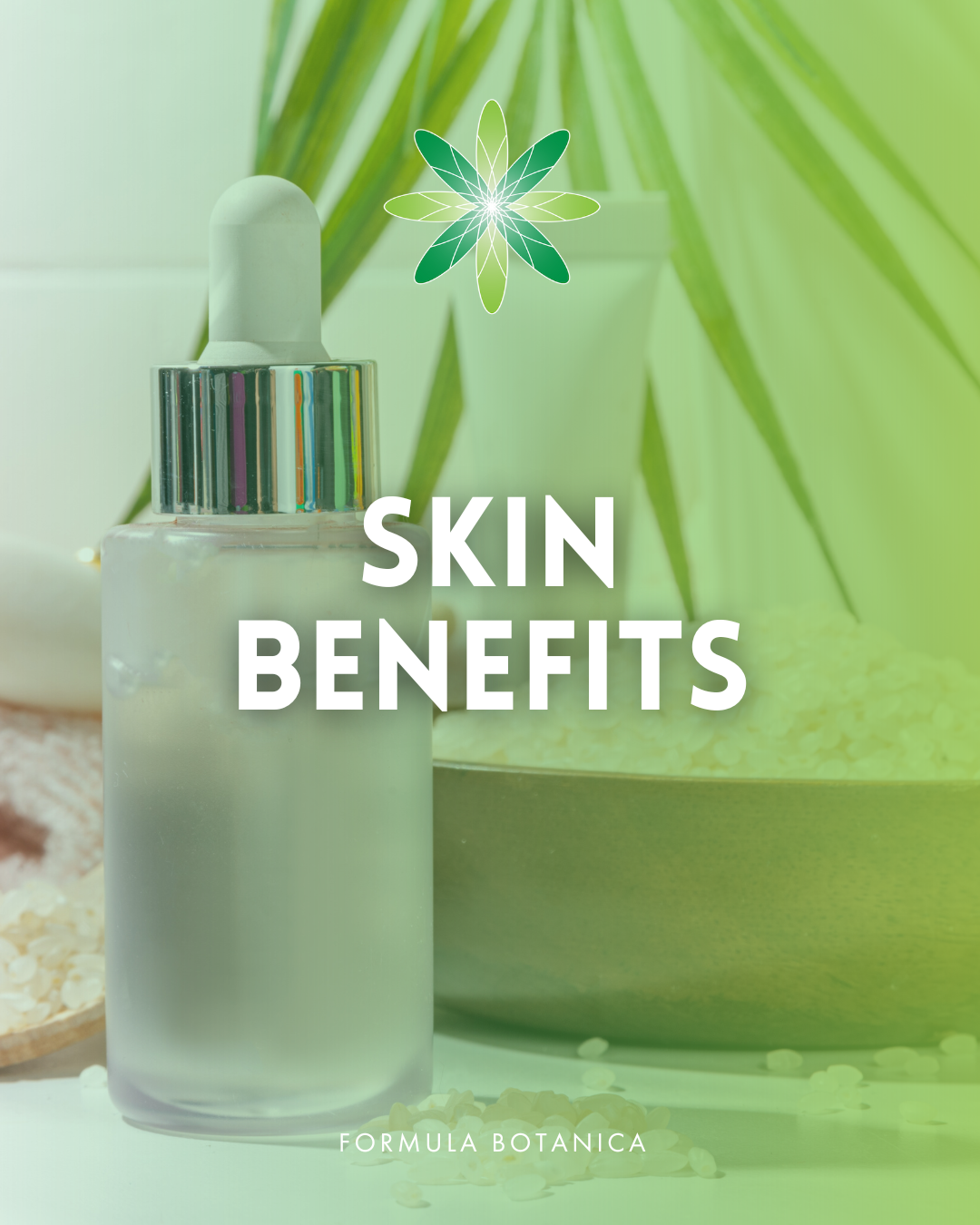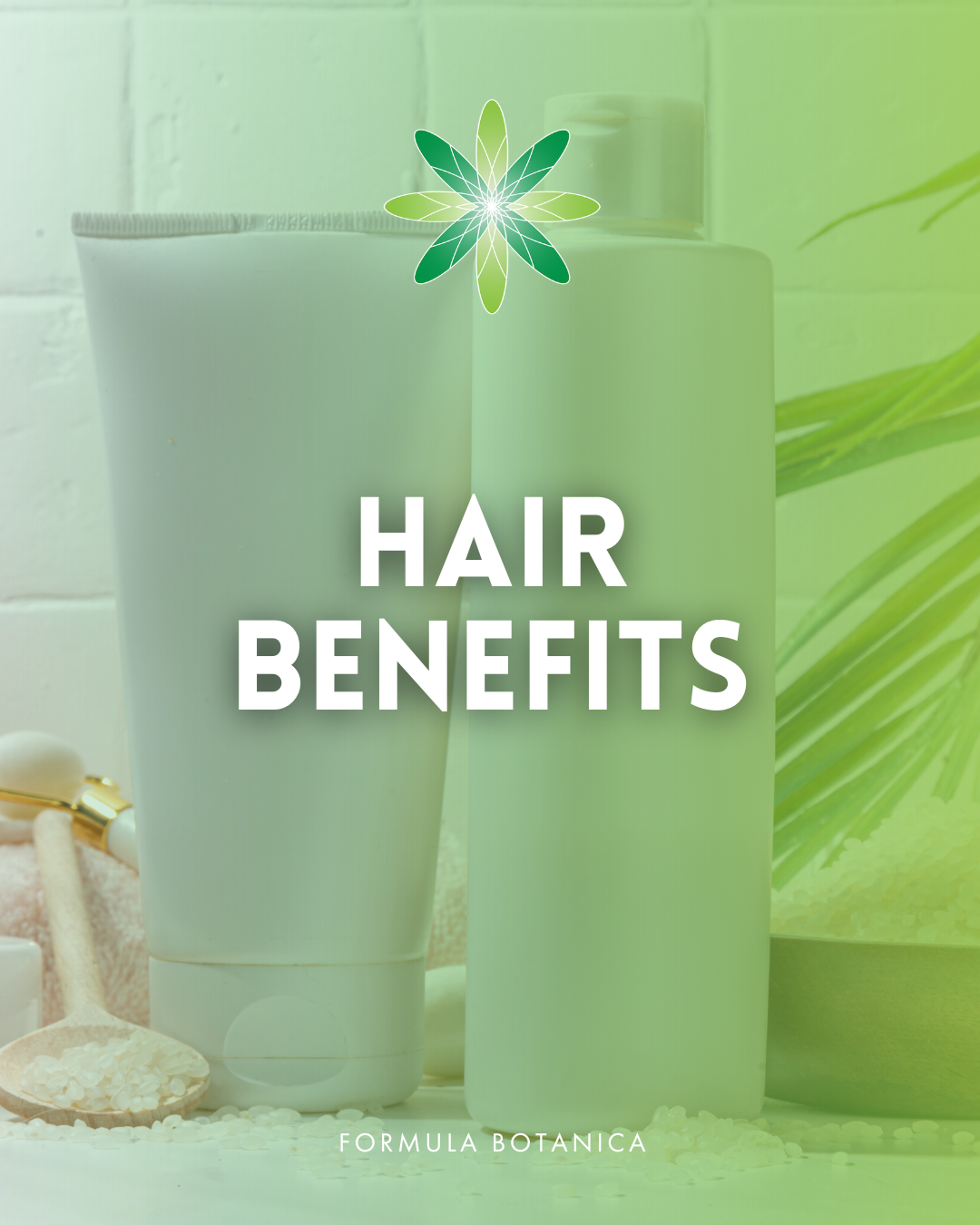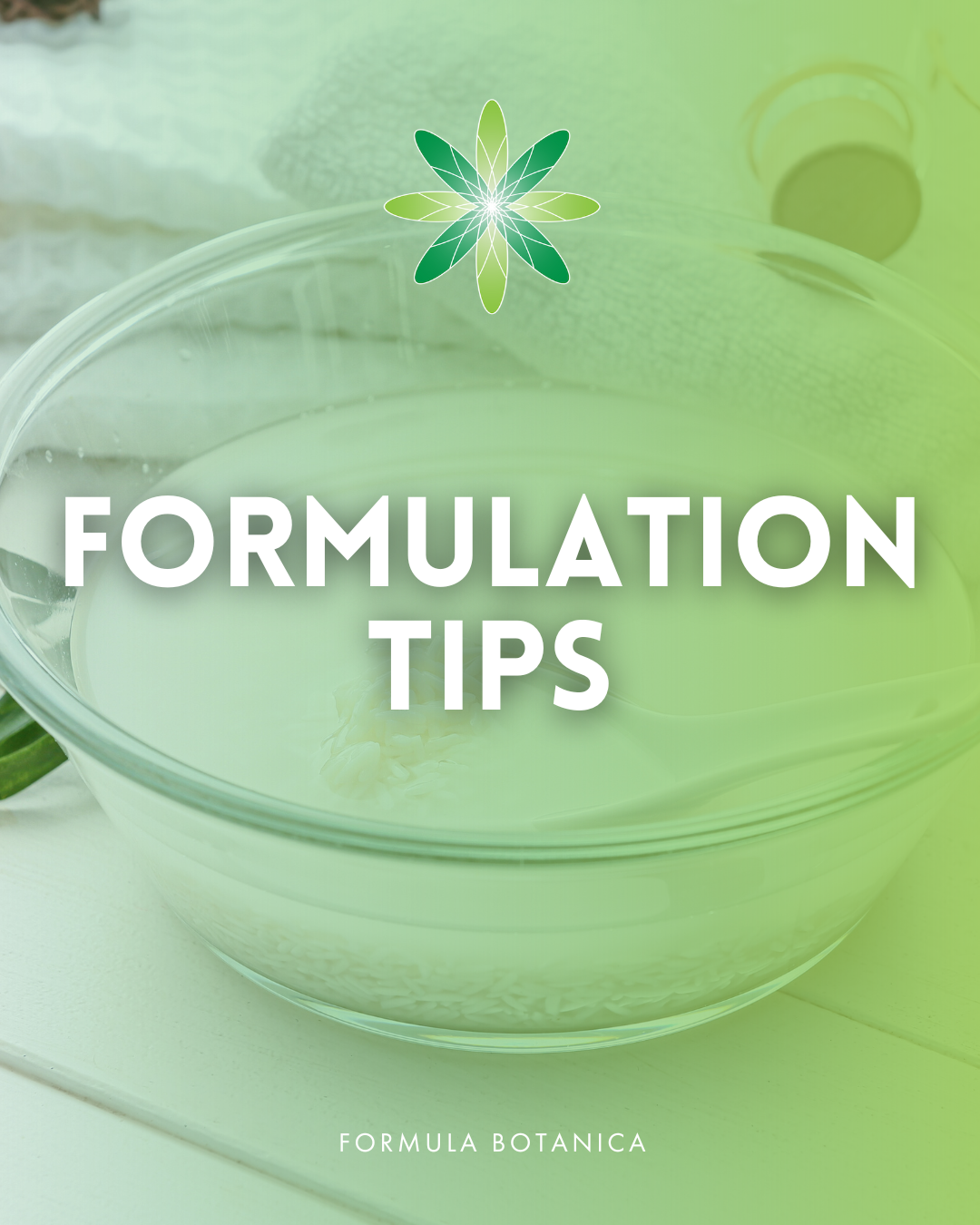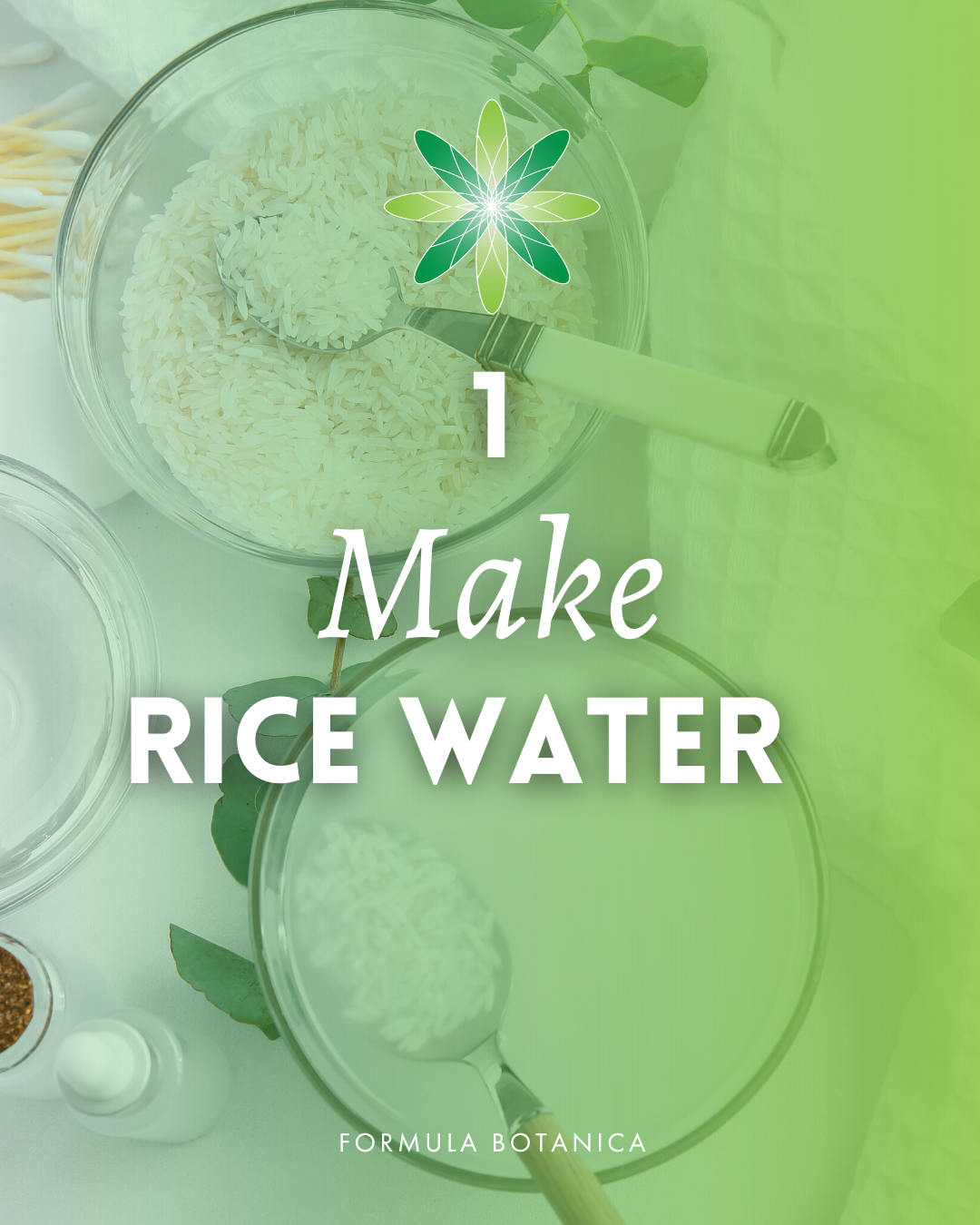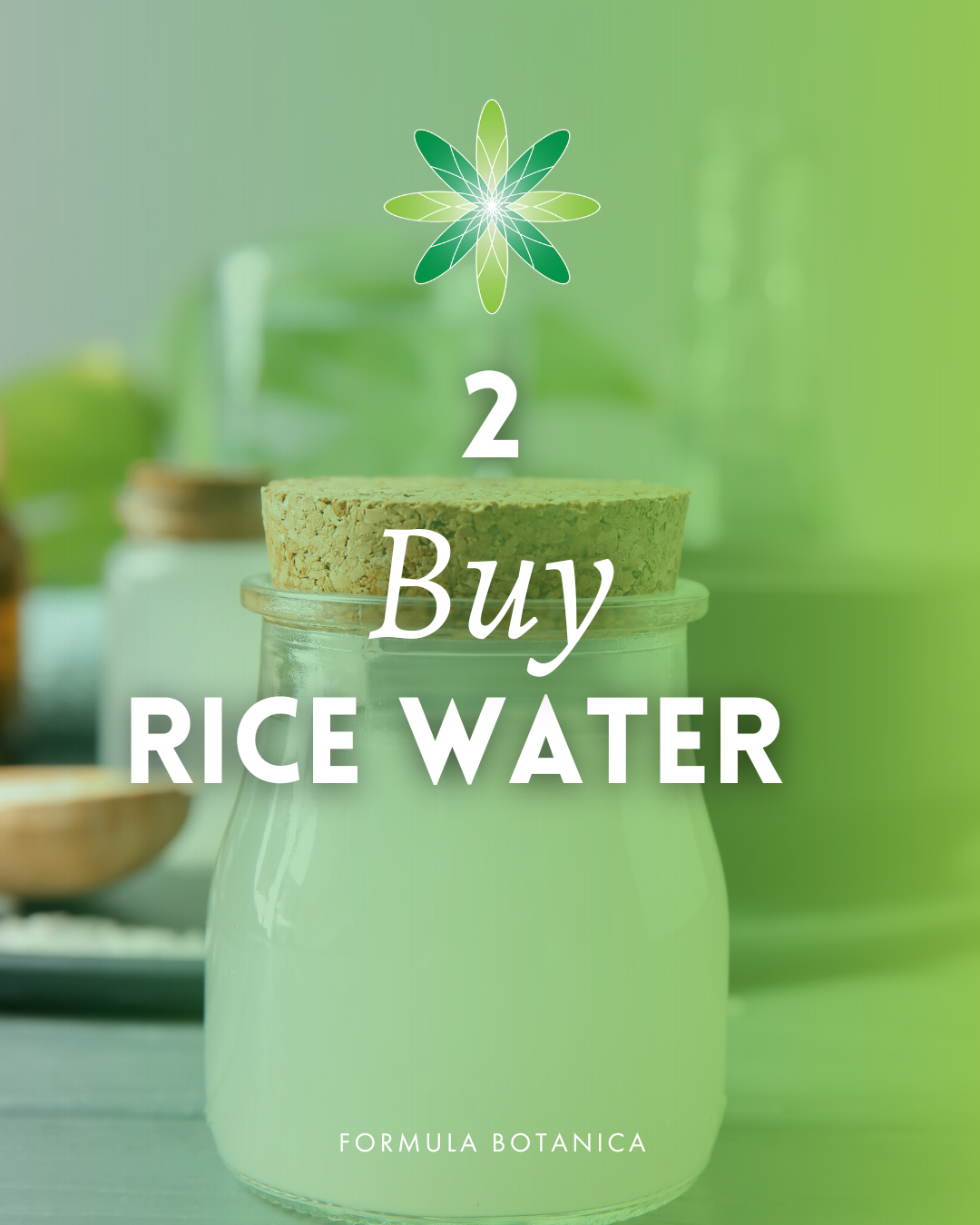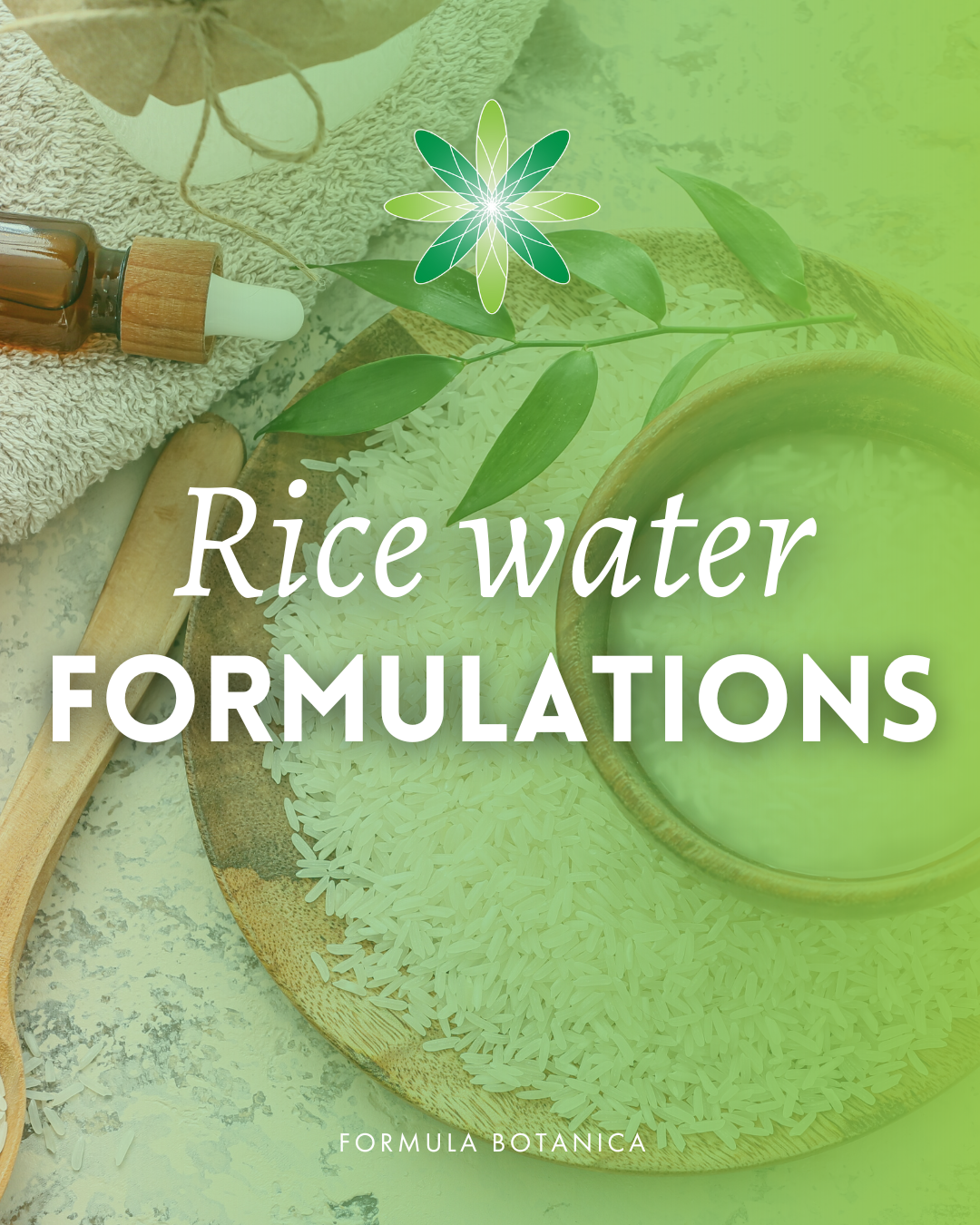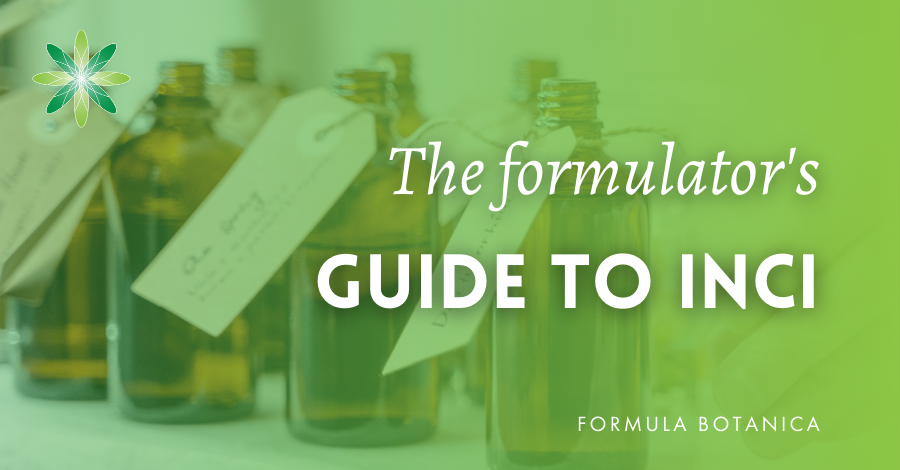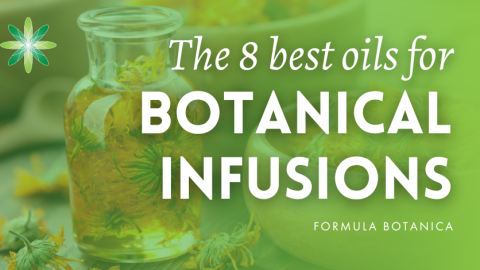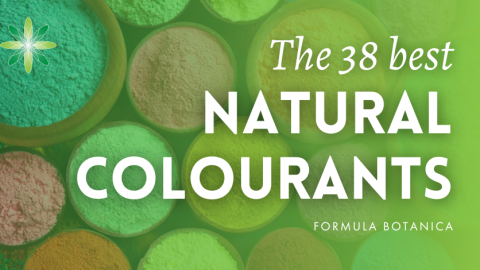Meet rice water, a kitchen byproduct turned beauty staple. Trending on TikTok, this popular ingredient has been used in Asian cultures for hundreds of years as a DIY ingredient in cosmetic preparations.
Recently, it’s stepped back into the spotlight for its supposed anti-inflammatory, antioxidant, brightening, and anti-ageing properties. But is there any scientific evidence behind this? Does rice water actually work? And how do you formulate with rice water? Let’s find out.
In this blog post, we look into the science behind rice water and explore its potential skin and hair benefits. But there’s more- we also provide step-by-step guides to creating amazing beginner-friendly rice water formulations, from soothing facial toners to nourishing hair masks.
What is rice water?
Rice water is pretty much exactly what it sounds like. It is a starchy liquid leftover after soaking or boiling rice. It’s typically cloudy in appearance due to the starches released from the rice grains. This water can then be strained and used in various ways.
In recent years, rice water has gained popularity as a natural remedy for hair and skin, due to its alleged properties. Influencers, bloggers, and beauty lovers alike are incorporating rice water in their skincare and haircare regimes, claiming it gives them ‘glass skin’- aka smooth and glowing skin.
Why should you formulate with rice water?
Rice water has been used for centuries in Asian culture, particularly in Japan. Over 1,000 years ago, Japanese women used leftover rice water to brighten their complexion and stimulate hair growth. Today, rice water is all the rage again.
Easily accessible, rice water is trending for its supposed anti-ageing and hair-strengthening properties. This is an amazing opportunity for you to incorporate rice water in your cosmetic formulations. But first, let’s find out if there’s any scientific evidence supporting these anecdotes.
Skin benefits of rice water
Like many rice-derived ingredients, rice water contains many nutrients like vitamins, minerals, and amino acids that can offer potential skin benefits. While scientific evidence is still limited, we’ve found some of this ingredient’s key properties and skin benefits, so you can unlock its power in your cosmetic formulations.
- Antioxidant: Rice water is rich in antioxidants, meaning it protects your skin from free radicals and oxidative stress, which can cause premature ageing. A 2018 study (i) found that the rice water obtained after boiling rice contained a high polyphenol content- a class of antioxidants– which presented a similar antioxidant activity to that of vitamin C (ascorbic acid).
- Anti-ageing: In the same study, scientists tested a topical rice water gel on volunteers and concluded that rice water is a suitable anti-ageing cosmetic ingredient for skincare formulations. Another study (ii) tested the anti-ageing efficacy of fermented rice water and saw it present interesting anti-photoaging properties in UVA and UVB-induced fibroblasts- aka damage from sun rays.
- Anti-inflammatory: Additionally, rice water may have anti-inflammatory properties from the rice starch. This may help soothe irritation and calm dry skin, but more research is needed.
- Brightening: While more research is needed, rice water may also have brightening properties, which may help reduce hyperpigmentation and age spots.
- Hydrating: Last but not least, rice water is hydrating, meaning it helps moisturise the skin and reduce the appearance of fine lines and wrinkles. The study mentioned earlier found that boiled rice water can block the activity of elastase, which can prevent the breakdown of elastin, a protein responsible for the skin’s firmness and elasticity.
If you’re interested to learn more about skin ageing and how to formulate serums and lotions for mature skin, check out our Certificate in Organic Anti-Ageing Skincare.
Hair benefits of rice water
For centuries, women have used rice water to wash their hair. Today, this ancient practice is turning into the next haircare craze as more people use leftover starchy rice water to rinse their hair, hoping to achieve stronger and healthier hair. But is there actually any science behind this?
Some studies (ii) suggest that fermented rice water may enhance hair shine, growth, and strength. By now, you know that rice water is rich in starch, vitamins, minerals and amino acids, which makes it an excellent addition to your haircare routine. Plus, it’s an excellent upcycled ingredient as you are using water that would otherwise be discarded. Let’s explore more of the benefits of rice water in haircare:
- Nourishing: Researchers have found that rice water is rich in amino acids, which help the hair to lock in moisture.
- Conditioning: Similarly, amino acids have been shown to improve combability and add a radiant shine to hair.
- Strengthening: Rice water is rich in vitamin B (B1, B2, B6), which helps support healthy hair growth as vitamin B plays an important role in protein metabolism. The amino acids in rice water also help with fibre structure reconstruction and breakage.
- Restoring: Rice starch is rich in polysaccharides and the carbohydrate inositol, which can help repair and protect damaged hair.
- Antioxidant: Rice water is packed with antioxidants, which can help protect the hair against free radical damage. Antioxidants also help reduce and neutralise oxidative stressors, such as UV and pollution, against premature hair ageing.
How to formulate with rice water
When formulating with rice water, you have two options. You can either make your own rice water and preserve it, or buy premade rice water and add it to your water-based formulations.
If you’re new at this and are not yet familiar with natural preservation, we recommend the second option, as it is much safer. Learn more about preservation below:
Option 1: Make your own rice water
The first option is to make your own rice water and use the strained liquid as a gentle toner or a DIY hair mask. Studies (iii) suggest that the best method to make home-based rice water is to soak unwashed rice grains in cold water for 30 minutes, which guarantees the presence of essential nutrients for optimal skin and hair benefits, and then strain it.
You can then either use the starchy liquid directly on the skin as a face or hair mask (always patch test before) or store it in your formulation cupboard.
If you want to formulate with rice water later you have to add a preservative to prevent potential microbial contamination and monitor your preparation for stability. We teach preservation in our Certificate in Natural Cosmetic Preservation.
Option 2: Buy premade rice water
The second option, which we recommend, is to buy premade rice water. This is available as either preserved rice water or fermented rice water extract. Your supplier will tell you exactly how to use it, and which amount to incorporate in your skincare or haircare preparations.
Best rice water formulations
You can create amazing formulations with rice water. Any water-based product can have rice water in it, and benefit from its skincare or haircare properties. This includes micellar waters, gels, cleansers, face masks, toners, mists, serums, creams, lotions, shampoos, and conditioners. The sky is the limit!
We’ve compiled a list of beginner-friendly formulations below. Simply replace the distilled water or hydrosol with rice water, and use rice water instead of regular water to activate your powder cleansers and face masks.
Micellar waters
Gels
How to make a natural shower gel using surfactants
Make this easy DIY under-eye gel to revive your eyes
Cleansers
Formulate a simple gel face cleanser
How to make a gentle hand wash
Face Masks
Toners/Mists
How to make a witch hazel toner
How to make an aloe vera repairing mist
Serums/Creams/Lotions
How to make a rose hydrating facial serum
How to make a soothing CBD face & body cream
How to make a natural mint & melon in-shower lotion
Shampoos
How to make a jasmine and mandarin natural clarifying shampoo
Conditioners
Hair masks
Rice water: worth the hype?
Used for hundreds of years in Japan, Korea, China, and India, rice water is making its comeback in style. And it’s easy to see why. Its antioxidant, anti-inflammatory, and hydrating properties make it a great addition to your skincare formulations, especially those targeted at mature skin.
Rice water is also a valuable ally in haircare formulation, offering nourishing, strengthening and antioxidant benefits. And while the scientific evidence surrounding rice water is still limited, we believe that rice water is absolutely worth the hype.
We encourage you to try it for yourself and add rice water to your gels, cleansers, masks, toners, mists, serums, creams, shampoos, and lotions. Check out our free training, where you can learn how to formulate your own effective skincare from home using rice water and other amazing natural ingredients.
References
(i) Marto et al, 2018. Rice water: a traditional ingredient with anti-aging efficacy
(ii) Jamaluddin et al, 2023. Biochemical and gene expression studies reveal the potential of Aspergillus oryzae-fermented broken rice and brewers’ rice water extracts as anti-photoageing agents
(iii) Yusuf-Salihu et al, 2023. Fermented rice water for biosynthesis of silver nanoparticles (AgNPs) and its antimicrobial activities against microorganisms associated with skin infection
Leave us a comment

Ariane is Formula Botanica’s Content Creator and an active member of the student community. She has worked as a professional journalist, blogger, copywriter and editor before joining Formula Botanica full-time in 2024.

